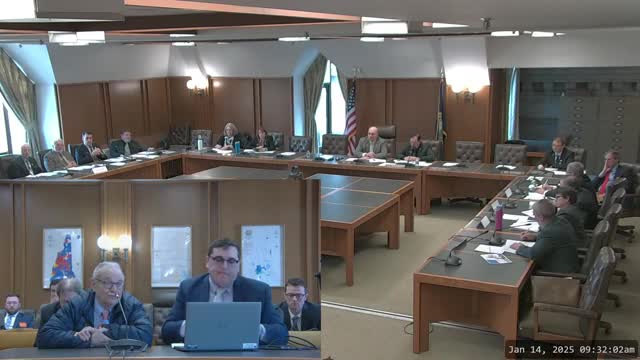Eversource, Unitil, Liberty and NHEC brief committee on customer bills, reliability gains and storm costs
Get AI-powered insights, summaries, and transcripts
Subscribe
Summary
Eversource, Unitil, Liberty Utilities and the New Hampshire Electric Cooperative told the Science, Technology and Energy Committee that multi‑year investments in distribution, automation and vegetation management have reduced outage frequency and duration, but recent larger storms and new program requirements are increasing operational and capital pressures.
Four utility groups — Eversource, Unitil, Liberty Utilities (Granite State Electric) and the New Hampshire Electric Cooperative — briefed the Science, Technology and Energy Committee on Jan. 14 about reliability trends, bill components and storm costs.
What they own and do. Eversource emphasized it no longer owns generation and is a transmission and distribution company; the firm said default service power purchases are a direct pass‑through. Unitil and Liberty described combined electric and natural‑gas footprints; NHEC explained its cooperative, member‑owned governance and nonprofit model.
Customer bills and default service. Utilities walked members through bill components: default service (energy commodity), distribution and customer charges, transmission and system benefits charges (funding energy‑efficiency programs and EAP). Eversource said default service is a pass‑through and described new procurement approaches that include direct market purchases for a portion of load.
Reliability metrics and investments. Utilities pointed to multi‑year investments in vegetation management, pole and conductor replacement and automation. Eversource reported improvements such as 51% of outages restored within five minutes (faster self‑restoration via automated switches) and lower system average interruption duration indices (SAIDI) and frequency indices (SAIFI) over a multi‑year trend; Granite State and Unitil provided similar trend charts showing declines in outage frequency and duration. NHEC highlighted its cooperative model and member‑funded approach to infrastructure.
Storm costs and trend warnings. Utilities noted an escalating frequency of severe storms that have placed pressure on operations and budgets; Eversource and others cited multi‑day events and the 2023‑2024 heavy snow/ice and wind events that drove significant restoration expenses. Utilities said capital and operating budgets must balance customer affordability and resiliency investments.
Clean energy funds and programs. Utilities summarized involvement in federal and state programs: Eversource and Unitil discussed regional heat‑pump funding (EPA grants and RGGI proceeds) and EV/charging incentives; Unitil described a 5‑MW utility‑owned solar project built under state rules allowing utilities to build a limited share of distributed generation; NHEC described a broadband subsidiary deploying fiber to rural members.
Why it matters. Utilities told lawmakers new state and federal clean‑energy funding opportunities add administrative and compliance workload even while persistent staffing constraints and capital needs affect permit turnaround and project delivery timelines.
Ending. Utilities asked lawmakers to consider the interactions of grants, regulations and staffing levels when crafting deadlines or program requirements and offered to supply data and follow‑up briefings on rate impacts, permitting timeframes and reliability investments.
